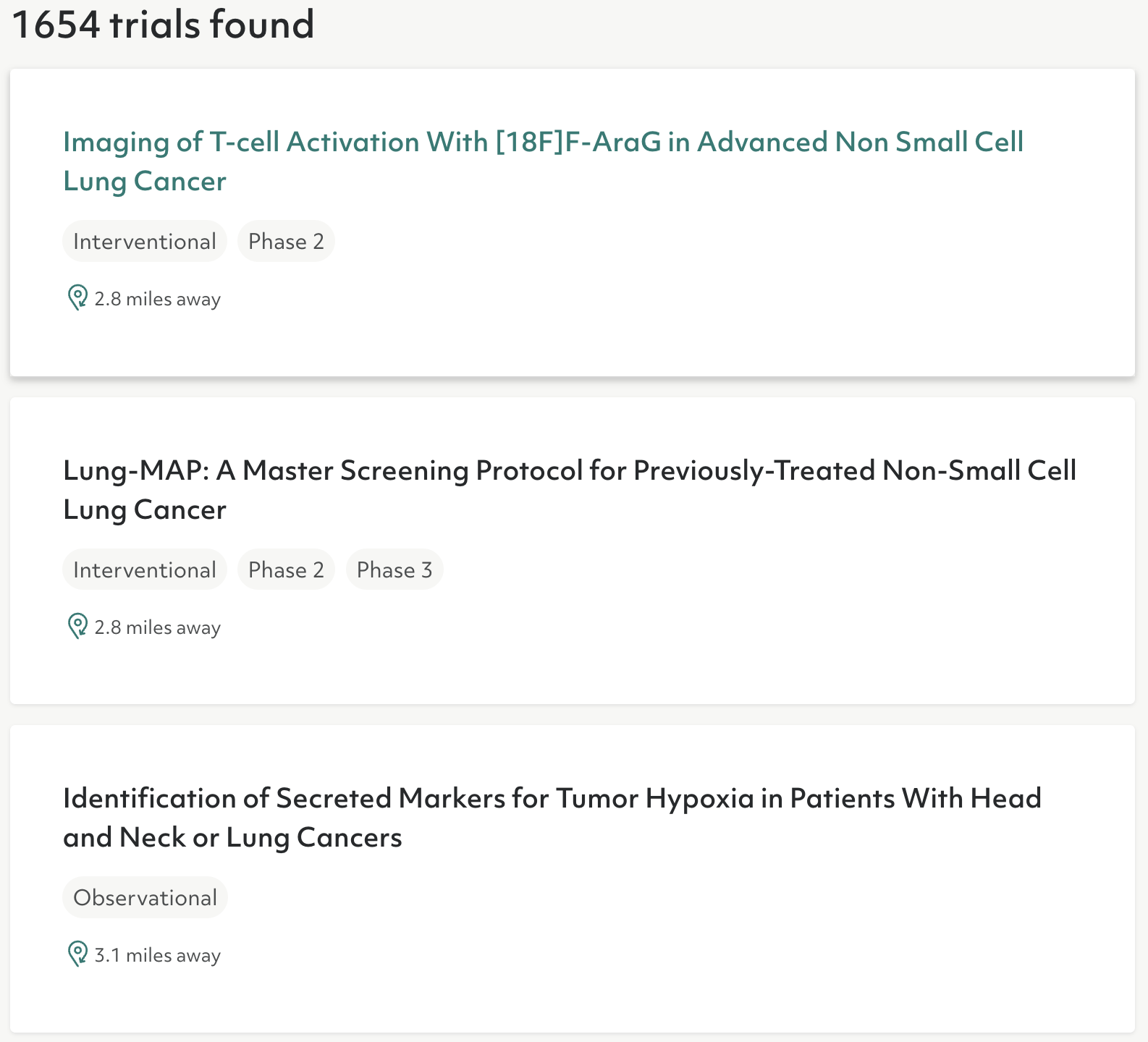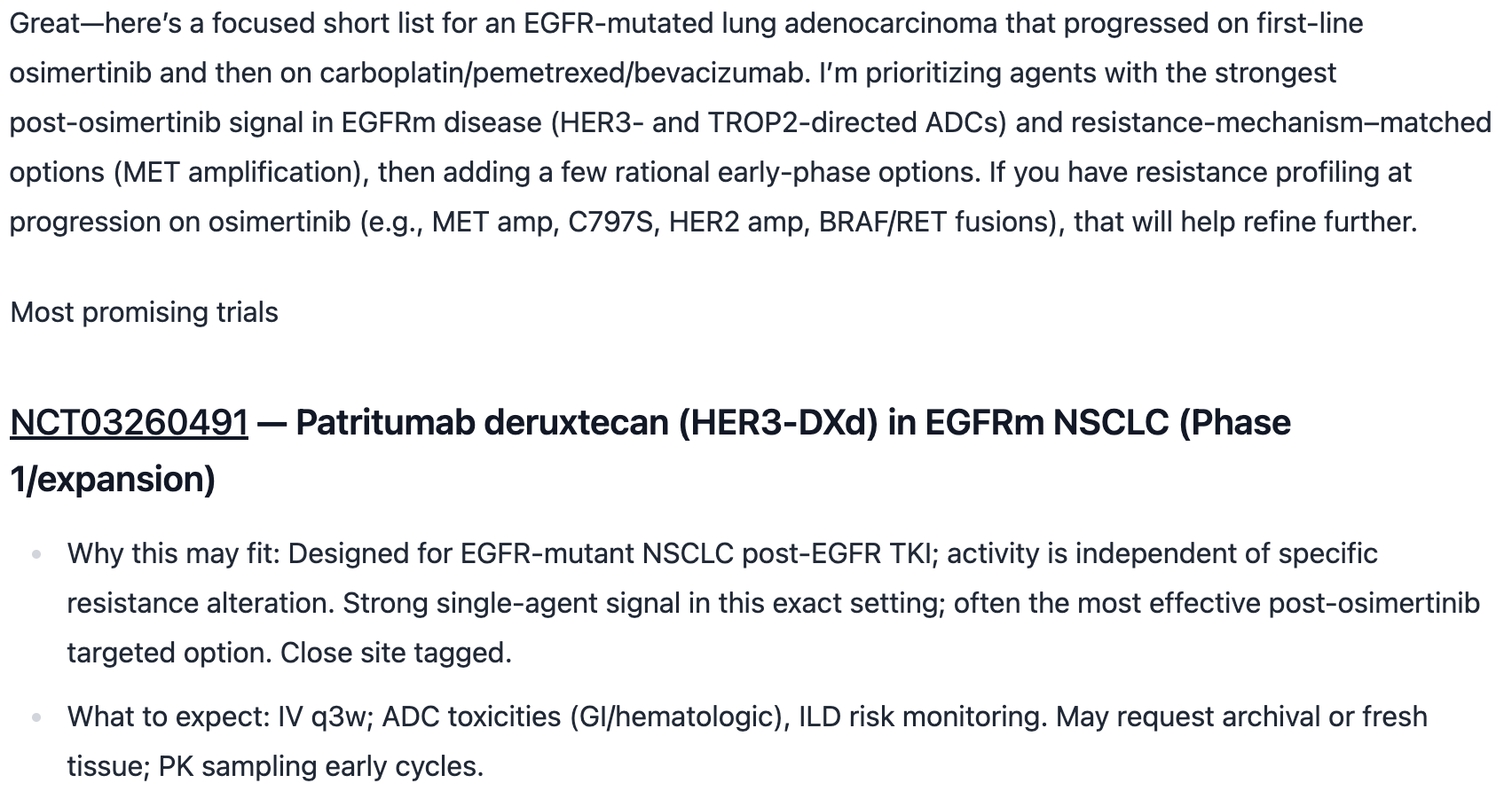Head to head trial match results!
September 24, 2025 Michael Gensheimer
There are a lot of web sites out there to help match cancer patients to clinical trials. I'm extremely proud of the results that HealthScout gives and how they are personalized to the patient's specific cancer situation. But many of the other sites also claim to deliver personalized and helpful results. From trying out many of them I am confident that HealthScout gives the best results and it is not at all close, but for non-experts it might be hard to evaluate this.
So I thought I would go through a sample patient's results from HealthScout and a prominent other site to see how they compare. I am not naming the other site because my focus is not on that specific site, but I will mention that major patient advocacy groups partner with them to do trial matching, so many patients probably use their site every day.
Patient Scenario
Our hypothetical patient is a 63 year old woman with metastatic non-small cell lung cancer (adenocarcinoma). The cancer has an EGFR mutation and she has been on osimertinib with cancer growth, and then on carboplatin/pemetrexed/bevacizumab, also with growth. Her oncologist is looking for clinical trial options and also considering some FDA-approved treatments like amivantamab.
Other Site Results
First let's look at the other site's results. The other site asked some general questions like the patient's age and what cancer type they have, but did not ask about mutations or treatment history. Perhaps because of this, a lot of trials were found:

The results are not strong. The first result is for an imaging trial that does not involve any new treatments. It requires patients to go on immunotherapy, which is not a good fit for this patient with an EGFR mutation who would have a low chance of responding to pembrolizumab.
The second trial initially looks more promising. Lung-MAP is a complicated "master protocol" trial with multiple sub-studies that different kinds of patients are eligible for. There is a sub-study of Lung-MAP for patients with EGFR-mutated lung cancer who progressed on osimertinib (NCT05642572), so this could be good for our patient. But, if you go to the EGFR sub-study trial's entry in ClinicalTrials.gov or HealthScout, you will see that the patient must have had "osimertinib, alone or in combination with other agent(s), as their most recent line of therapy." Our patient was on chemo after osimertinib, so would not be allowed to go for the trial.
The third study is a blood collection study that does not involve any new treatments and would not help our patient.
Overall, the results are disappointing and would not offer any hope to this patient who is looking for promising new treatments. The trials showed up in a random order. There is no explanation of why the trials were picked or why they might be a good fit.
HealthScout Results
Now let's look at the results from HealthScout. I entered the patient's info, clicked on AI Picks, and wrote "I just want the most promising trials for this patient's clinical scenario. I am a medical oncologist."
Here is the beginning of the results:

This is much better! The computer is correct that trials looking at EGFR mutant disease with resistance to osimertinib are likely a good fit for our patient. The first trial is testing a very promising HER3-targeted drug for this situation. The second trial is not in the screenshot but is NCT06305754, testing Sacituzumab tirumotecan, an exciting antibody-drug conjugate that has shown tumor reductions in prior trials. The patient's situation fits this trial exactly, because it requires the patient to have had a drug against EGFR such as osimertinib, followed by chemotherapy, which is exactly what our patient had. HealthScout is able to figure out that the patient fits this trial since it uses details like the exact order of treatments when determining eligibility.
The later trials in the list are also promising options. Finally, the computer asked some clarifying questions about whether we have further molecular testing to look for things like MET amplification which would help customize the trials list further. It is easy to chat with the AI to get more info about the trials or clarify what they are looking for. By clicking on a trial we get a custom summary of its goals and patient population, and a discussion of how promising the results of the investigational drugs are. This makes it easy to make a shortlist right within HealthScout.
Conclusion
The HealthScout trial picks are not going to be perfect and there is no substitute for discussing with an expert oncologist who is familiar with trials for the patient's cancer type. But compared to other trial matching sites, HealthScout consistently finds options that are aligned with the patient’s molecular context and recent lines of therapy, explains why a trial might fit (or not), and proactively asks the right clarifying questions to refine the list. This means fewer false leads, faster paths to the most promising studies, and better conversations between patients and their care teams.
